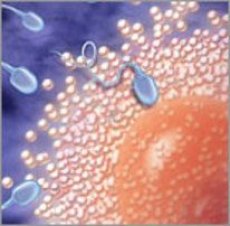Medical expert of the article
New publications
Conception: 2 weeks
Last reviewed: 06.07.2025

All iLive content is medically reviewed or fact checked to ensure as much factual accuracy as possible.
We have strict sourcing guidelines and only link to reputable media sites, academic research institutions and, whenever possible, medically peer reviewed studies. Note that the numbers in parentheses ([1], [2], etc.) are clickable links to these studies.
If you feel that any of our content is inaccurate, out-of-date, or otherwise questionable, please select it and press Ctrl + Enter.

How does the child grow?
Before it actually starts growing, the body has to prepare for conception. Last week, an increase in estrogen and progesterone coursing through the bloodstream created a blood-rich lining to support a potentially fertilized egg. At the same time, in the ovaries, eggs were maturing in follicles. Early this week (often day 14 in a 28-day cycle), you ovulate: One of the eggs is released from the follicle and travels down the fallopian tube. Over the next 12 to 24 hours, the egg will be fertilized if one of the 250 million sperm reaches the uterus.
Over the next 10 to 30 hours, the sperm fuses with the egg to form genetic material. If the sperm carries information with the Y chromosome, the baby will be male; if it carries the X chromosome, the baby will be female. Over the next three to four days, as the fertilized egg (now called a zygote) moves from the fallopian tube into the uterus, it will divide into 16 identical cells. Once the zygote enters the uterus, it is called a morula. The developing fetus is a collection of cells formally called a blastocyst that now has an inner cell mass that will become the embryo, a fluid-filled sac that will become the amniotic sac, and an outer cell mass that will become the placenta, a pancake-shaped organ that provides the baby with oxygen and nutrients and removes waste products.
Important: Each baby's development is unique. Our information is designed to give you a general idea of fetal development.
Life changes in the second week of pregnancy
The last menstruation was 12 - 16 days ago, which means ovulation should occur now. It may seem strange, but the gestational age of the child is counted from the first day of the last menstruation. Pregnancy lasts approximately 38 weeks from the moment of conception, but since it is often difficult to determine exactly when the egg and sperm fuse, doctors talk about 40 weeks.
To increase your chances of conceiving, try to have sex 72 hours before ovulation and 24 hours after. Don't despair if all your efforts fail to produce the long-awaited pregnancy; most couples need several attempts.
One important piece of advice: if you are planning a pregnancy but have not yet given up alcohol, cigarettes and drugs, now is the time to do so, as your body needs to be in the best shape to conceive a child. Don’t forget to take a multivitamin that contains at least 400 micrograms of folic acid (ideally three months before pregnancy) to reduce the risk of birth defects in the baby.
Make it romantic. "When we were planning to have a baby, we went the extra mile (we figure good sex can help with conception!), so we had a romantic candlelit dinner and filled the bedroom with flowers. We felt so much closer to each other, and who knows? Maybe it worked. We're expecting a new addition in a few months." - Trish
3 Questions about…
- The Best Sex Positions for Conceiving a Child
There is no scientific evidence that certain sex positions help you conceive. You may have heard that positions that get semen to your cervix faster, such as the missionary position (man on top), are the best option. Unfortunately, there is no research to support this hypothesis. To increase your chances of conceiving, have sex a day or two before ovulation and on the day of ovulation.
- Does having an orgasm affect the process of conceiving a child?
There is an opinion that female orgasm after the partner's ejaculation reduces the chance of conception, but there is no scientific evidence to support this hypothesis. Female orgasm is not a prerequisite for conceiving a child.
- Should you stay in a lying position after sex?
There is no scientific evidence that this matters, but it can't hurt. Staying horizontal for about 15 minutes after ejaculation keeps the semen in your vagina. If you have been trying to conceive for a year or longer, are over 35, or have irregular menstrual cycles, you should see a specialist.


 [
[